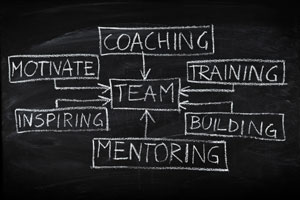How To Recruit Your Own Mentor
How To Recruit Your Own Mentor

"Whether you're an engineering student, seeking a new job, or looking for ways to grow your career, a mentor can help you find and climb the steps to success," affirms Allison McWilliams, Director of Mentoring and Professional Development at Wake Forest University.
"Mentors see our strengths and interests, and then encourage us to develop these assets to achieve our goals," she explains, "It's a relationship that goes beyond networking or informational interviews." Good mentors ask thoughtful questions that enable them to give you objective, valuable feedback.
How can you connect with one? Organized mentoring programs, often run by professional associations, are usually accessible, structured, and time-limited with well-defined goals. You can check with a local or campus chapter of any professional science or engineering group to see if they have one.
McWilliams remarks that more often, though, mentors are found informally. "Think about your go-to person for getting feedback or making decisions. Do you sometimes stop by their office to ask a question? Those people are your mentors, even if you don't call them that!"
Depending on your comfort level, you can formalize the relationship a bit. "Remember, being a mentor is a commitment of time and responsibility. If someone has been very helpful and you feel a connection, be respectful of their time, while trying to confirm their interest," she suggests. (Using the word 'mentor' isn't essential) Instead of simply dropping by to talk sometimes, you could say, "I know you have a lot on your plate. Would you be willing to get together every month?"
Be very specific. McWilliams stresses, articulate your goals. "It helps to say, 'These are some things I would like to work on in the next six months.' That's much easier to respond to than an open-ended request. Be clear about what you're asking for because that sets parameters. Remember, the person you're approaching is busy with their own goals, too."
"Approaching someone you barely know is challenging, but possible," notes McWilliams, "Make a list of people who've impressed you because of smart or interesting things they've done professionally. Ideally, you've had a brief conversation with them or an informational interview." Tell the person something you admire about their accomplishments. Then ask, "I'd love to hear a little about your career and the choices you've made. Can I buy you coffee or lunch, and ask a few questions?"

"They'll appreciate your thoughtfulness and courtesy. This would be a great way to learn things you'd never know otherwise," McWilliams advises.
Mentoring relationships are not permanent. "If you told the person up front that you'd like to meet with them over six months, acknowledge that after six months. And even if you didn't specify a time frame, there comes a point when you know if you've achieved or advanced towards the goals you identified," says McWilliams.
"If you've met the goals, the mentor knows. But whether you have or haven't, isn't a reason to discontinue the relationship," she stresses. For instance, you can tell the person, "I haven't achieved exactly what I set out to do, but we've opened some other threads I never thought of." Or you might say, "I've accomplished what I asked you to help with." And it is also fine to add, "I would love for this to continue – how do you feel about that?"
"You will have different mentors throughout your career," McWilliams notes, "As you change jobs or take on new roles. By paying attention to your own goals and progress, you'll be able to benefit from each of these relationships."
--------------------------------------------------------------------
The ASME Mentoring Program is designed to give Mechanical Engineering Professionals an opportunity to share their knowledge and help the next generation thrive.



